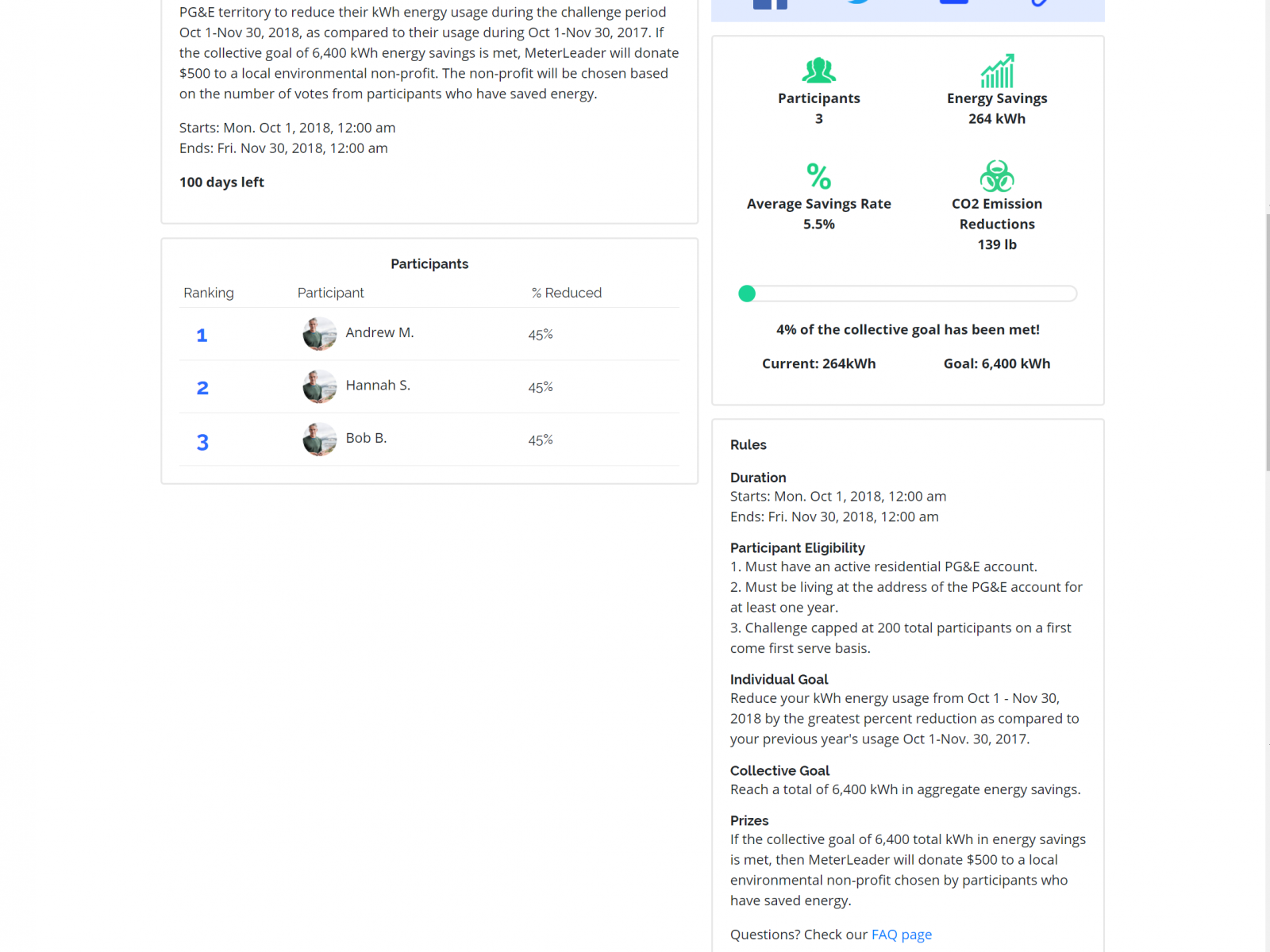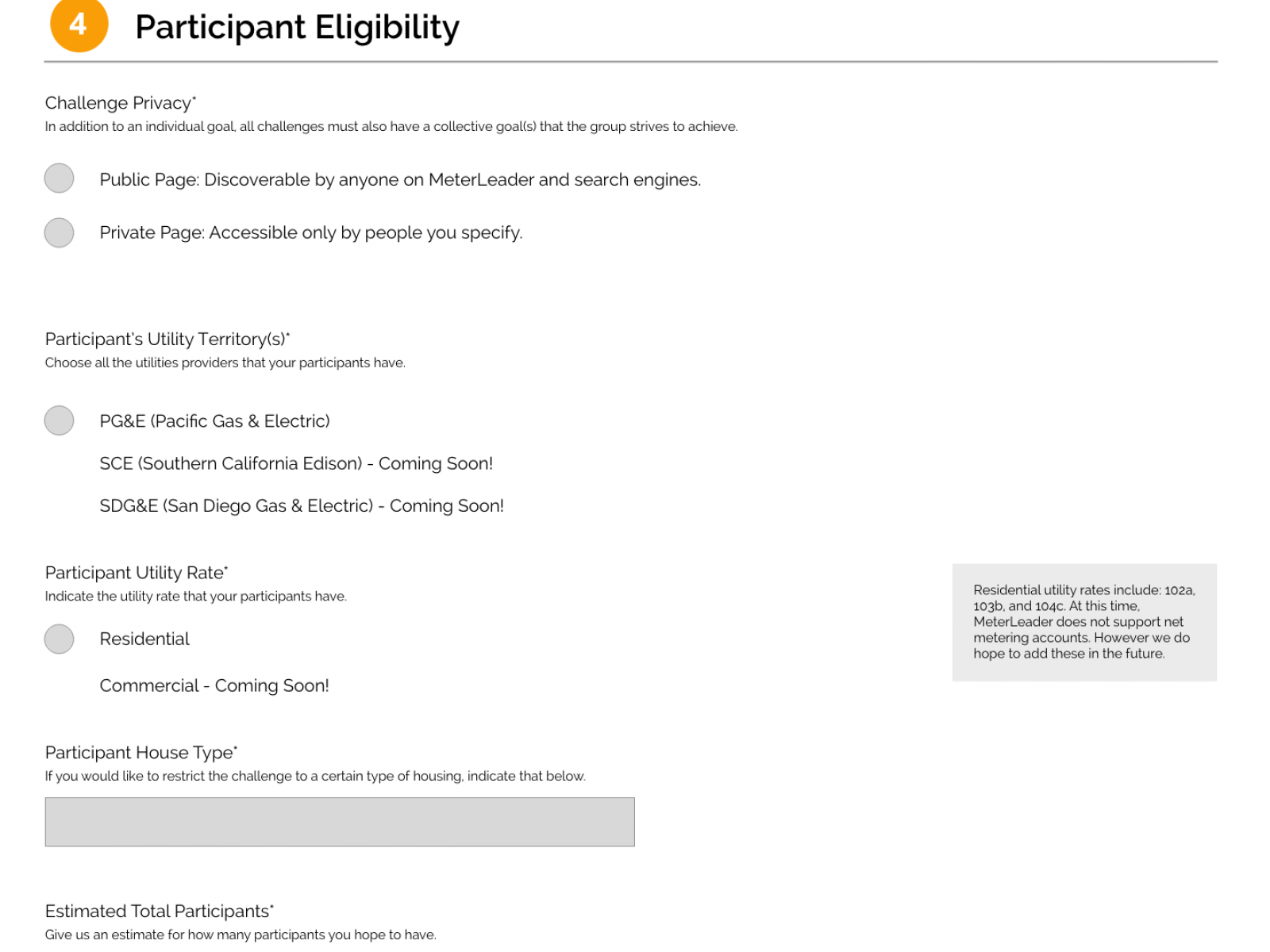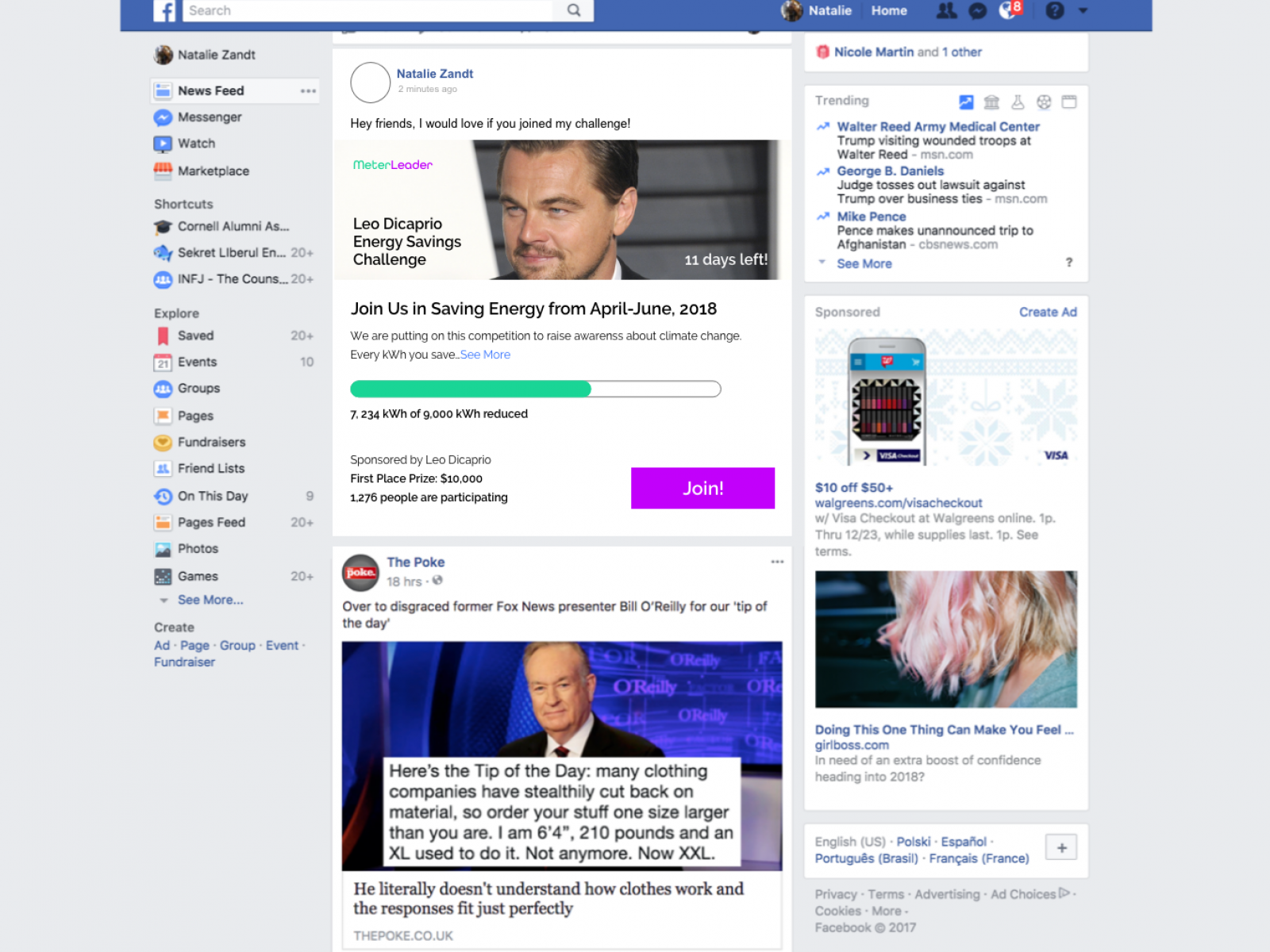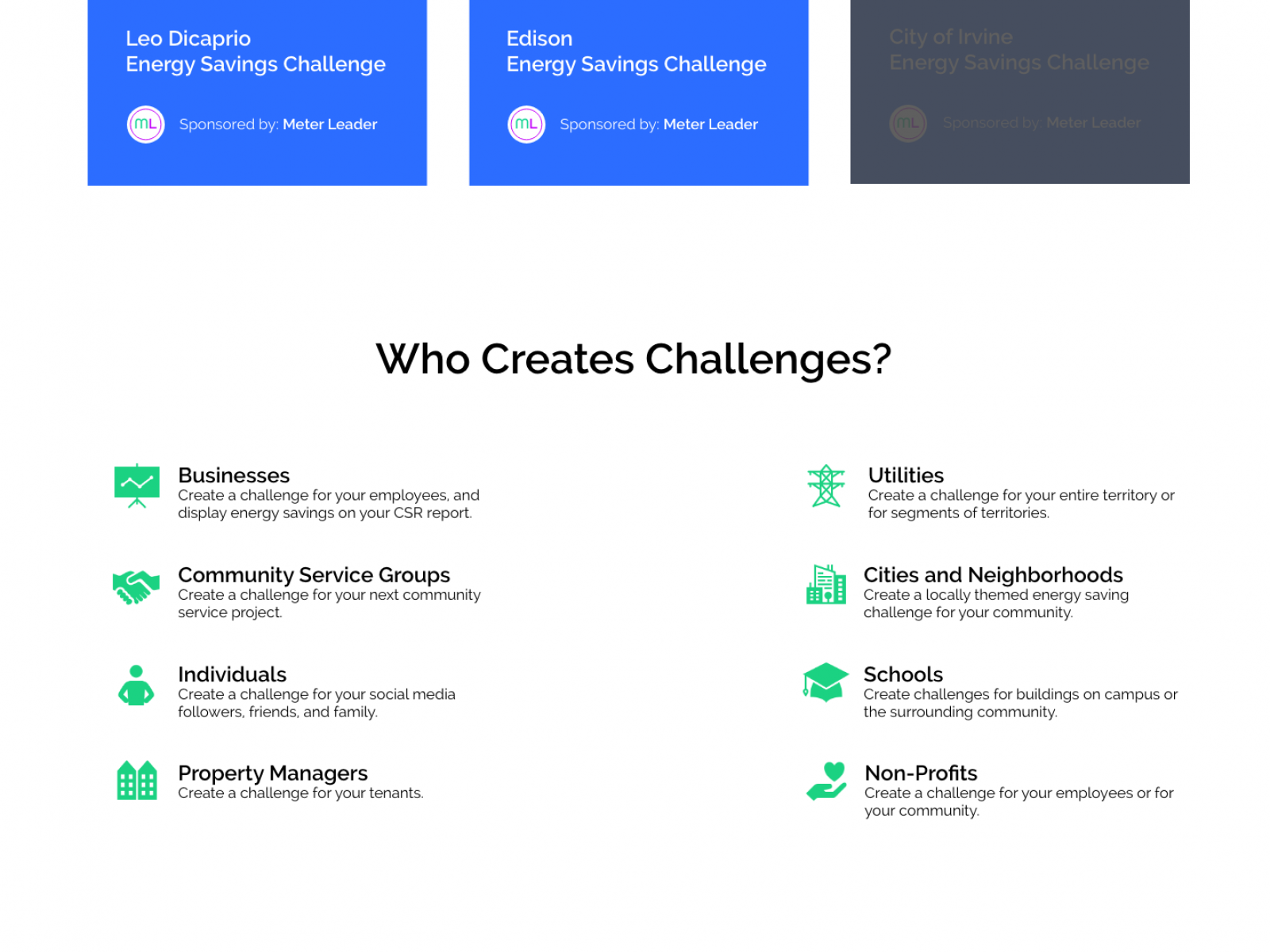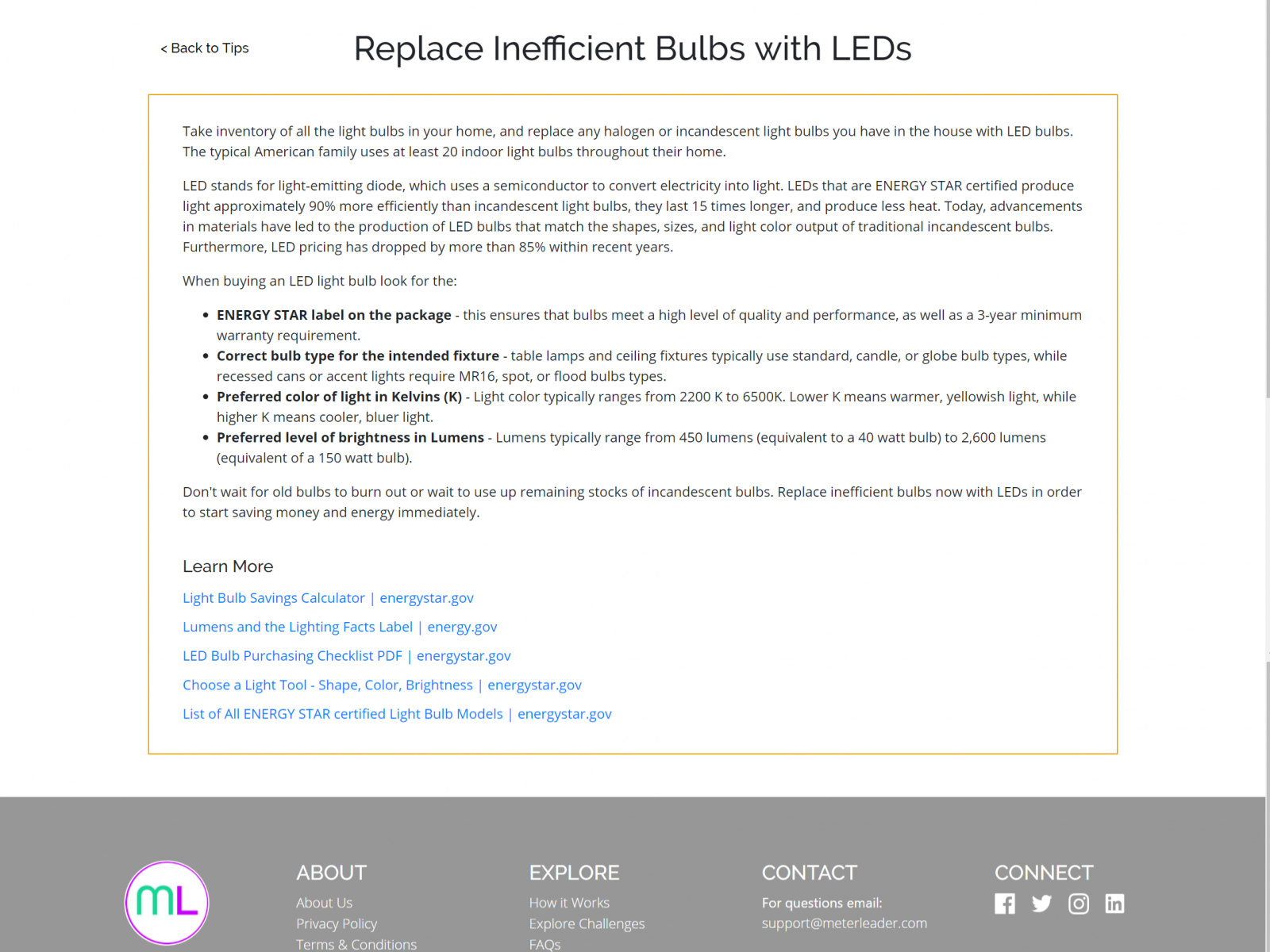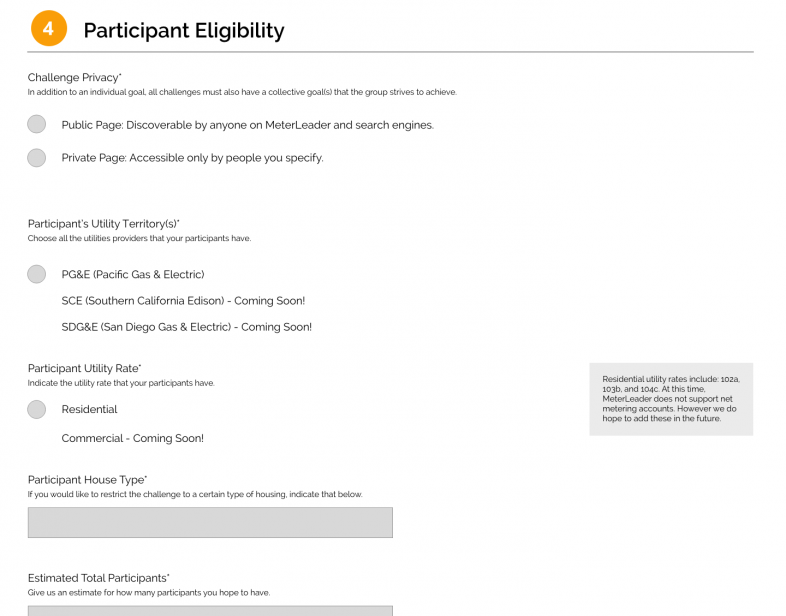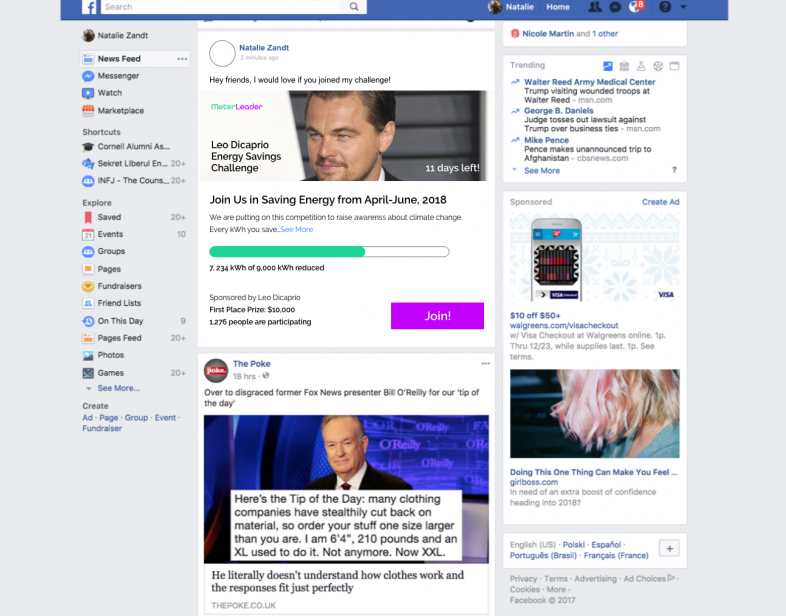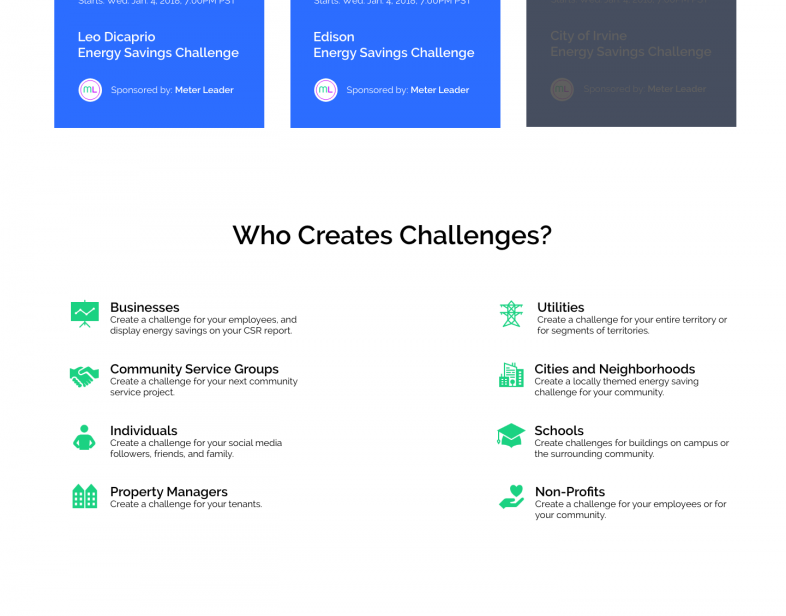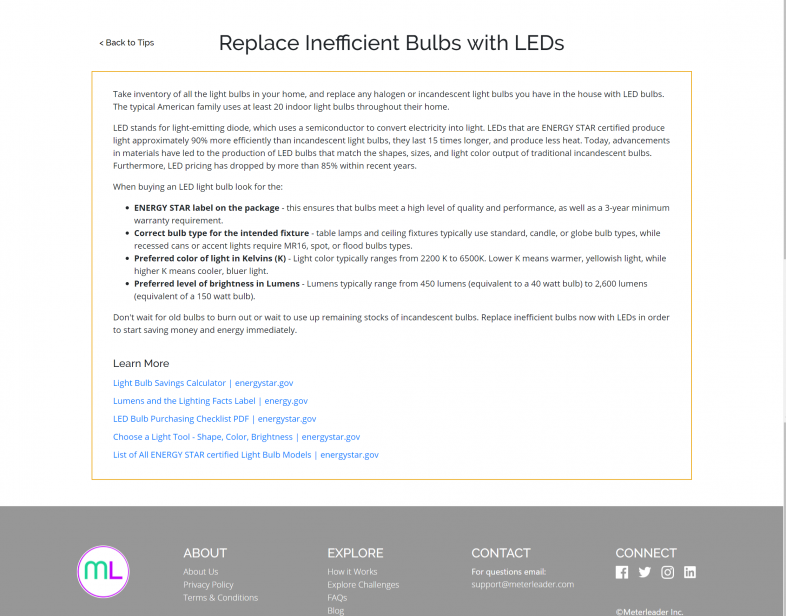An Overview Of Our Solution
Organizations like cities, utilities, businesses, celebrities, community organizations, and non-profits, want to support energy reduction efforts, however such efforts typically: require a lot of resources, do not produce quantifiable results, are invisible to their customers, and lack employee/constituent engagement.
MeterLeader addresses these barriers using behavior change. It is a digital platform that crowdsources energy savings via energy saving “fundraiser” events. MeterLeader is the GoFundMe of energy savings. The platform allows organizations and individuals to easily create and/or participate in energy saving fundraisers that are integrated with real time utility data. MeterLeader leverages the power of energy data and community in order to make saving energy fun and meaningful.
MeterLeader aims to launch its beta version in September 2018.
- Population Impacted: 5.4 million potential users
- Continent: North America
Context Analysis
The largest source of global greenhouse gas (GHG) emissions (33%) comes from electricity generation. However a proven way to drastically cut emissions, is for home and building owners to reduce their energy consumption and adopt energy efficient technologies.
Organizations like cities, utilities, businesses, and non-profits, want to support energy reduction efforts, however such efforts typically: require a lot of resources, do not produce quantifiable results, are invisible to customers, and lack employee/constituent engagement.
Fortunately, there is much inspiration to draw from. Utility behavior based programs leveraging social comparison theory have produced an average 1-2% energy savings per household. Similarly energy saving competitions can achieve up to 7% energy savings per household.
In addition, crowdsourcing, as executed by platforms like AirBnb, Uber, and GoFundMe, is proving to be an effective way to combat large scale problems.
Describe the technical solution you wanted the target audience to adopt
MeterLeader is a digital platform that crowdsources energy savings via energy saving “fundraiser” events that use real utility data.
Our target users includes: cities, utilities, businesses, property managers, community groups, and non-profits. When they create a fundraiser, they set parameters like: the fundraiser duration, kWh energy savings goals, participant eligibility, and prize listings. Community members are recruited to participate using social media.
To join a fundraiser a participant must sync their utility account using MeterLeader’s GreenButton feature. GreenButton is an industry effort that allows utility customers to share their meter data with third parties in a safe and secure manner.
Energy savings “donated” to the fundraiser are calculated from the difference of the household’s energy consumption during the fundraiser period as compared to that same time in the previous year. If aggregate energy savings goals are met, participants may win prizes.
Type of intervention
Describe your behavioral intervention
Energy in buildings is typically wasted due to wasteful inhabitant behavior and inefficient technologies. Simple behavior changes like: reducing air conditioning use, reducing the length of showers, and upgrading equipment, can yield significant energy savings. In order to get users to adopt these behavior changes, MeterLeader leverages the power of social comparison theory. Social comparison theory states that we determine our own social and personal worth based on how we stack up against others. Fitting within social comparison theory framework are descriptive and injunctive social norms. Descriptive social norms involve perceptions of which behaviors are typically performed by others. We specifically designed the fundraiser page to show the images and first name’s of the participants in order for others to know that real people (not bots) in their community are achieving real measures of energy savings. Injunctive social norms assist an individual in affirming their good pro-social behavior. The aggregate count of the group’s energy savings and GHG emission reductions, reinforces that this fundraiser is an effort to combat the global problem of climate change. MeterLeader has ensured that users will reduce their energy consumption because we apply proven best practices related to behavioral science, and provide users with the knowledge needed to save energy, by providing users with an variety of no-cost, low cost, and high investment energy saving tips to implement.
As needed, please explain the type of intervention in more detail
MeterLeader also incorporates other types of behavioral interventions. For example, on the fundraiser page we employ intrinsic and extrinsic motivation. Those participants who have an affinity toward environmental causes will derive intrinsic motivation from seeing the collective group kWh goal met. While other participants will be motivated by the opportunity to gain recognition or win prizes.
MeterLeader also integrates emotional appeals through imagery and story telling. For example on its homepage, we have an illustration that shows diverse hands holding energy bolts. This image demonstrates the awe-inspiring concept of people power - the idea that we can all be part of a bottom up movement to save energy and combat climate change.
Describe your implementation
Meter Leader addresses our target users’ pain points by providing a turnkey platform that is easy to use, reasonably priced, and educates users on how to save energy. It doesn’t require a lot of time, money, additional staff, or any energy expertise, to create a fundraiser. The platform also seamlessly integrates real utility data as well as social media, which allows organizers to easily report out and market the amount of energy savings their organization has achieved.
MeterLeader ensures user adoption through the integrated of proven behavioral science principles. In addition, MeterLeader will work closely with fundraiser organizers to make sure that they are following successful fundraiser strategies.
External conditions that will enable success include: continued public pressure on companies to care about Corporate Social Responsibility (CSR), as well as interest in carbon footprint reduction.
MeterLeader’s future success will depend on several key factors. First, upon launch MeterLeader seeks to gain as much traction as possible. We will accomplish this by executing our digital marketing strategy. Traction will also provide the proof of concept that will be necessarily when seeking later investment. Secondly, partnerships with electric utilities, non-profits, companies, and high profile individuals will be important because they will increase the number of fundraising events, which will bring in more users and increase awareness. A diverse array of partnerships will also allow us to create case studies and best practices specifically suited to different organization types. Partnerships with utilities, will also allow MeterLeader to maintain the API data connections, and will can allow for future expansion to other states.
The only obstacle that MeterLeader has thus far faced is lack of resources. We are a small team with little capital, therefore we have found creative ways to get the design and development work completed.
External connections
MeterLeader has thus far engaged with partners and stakeholders primarily through user testing. To date we have conducted 21 user tests with people who have experience working as university sustainability directors, utility energy efficiency program managers, energy consultants, programmers for community service organizations, environmental non-profit staff, volunteers for grassroots climate change organizations, and property managers. These user testers have provided invaluable feedback, and have recommended the addition of specific features related to their needs.
Once MeterLeader launches, we hope to engage more with stakeholders like electric utilities, so that we can expand the number of utilities that we have data integrations with. We plan to attend several conferences in October in order to network and develop future partnerships.
With regard to other sectors, we hope to soon begin reaching out to water utilities. Water utilities will be a great partners for the MeterLeader platform. If water data was integrated into the platform, MeterLeader could deploy water saving fundraising events during draught conditions, and could be a tool that water utilities use to help meet usage quotas.
Down the line, MeterLeader also hopes to engage with energy and climate change policy being made at the local level. MeterLeader is an ideal cost effective way to help cities achieve their climate change mitigation goals.
Who adopted the desired behaviors and to what degree?
MeterLeader has not yet launched, however we believe our solution will motivate users to adopt energy conserving behaviors and technologies, because our platform is built on proven behavioral science principles.
For example in the energy efficiency industry, utilities already successfully deploy behavior change programs that leverage social comparison theory. These programs, commonly known as Home Energy Report Programs, save on average 1-2% energy savings per household. Furthermore according to “A Review of Energy Reduction Competitions Report” by CIEE, energy saving competitions, which are also based on social norms, are shown to save up to 5-7% in energy savings per household.
In addition, MeterLeader incorporates user experience and design best practices. Each of our web pages maintains a consistent visual hierarchy balanced by white space, in order to improve legibility. We also have a strong visual brand, with colors and imagery that appeals to both genders.
How did you impact natural resource use and greenhouse gas emissions?
MeterLeader crowdsources energy savings generated by households participants during fundraiser periods and aggregates them together. Individual energy savings are computed by calculating the difference in usage during the fundraiser period compared to the same time period in the previous year. The energy data is also weather normalized to account for temperature differences.
MeterLeader is building off of best practices shown to achieve up to 7% in energy savings. The state where these energy savings are achieved will determine the exact amount of GHG reductions.
However, extrapolations can be made. The average US household uses 897 kWh per month. In 2018, our platform will be live in California for about 3 months, and will support about 200 users. 200 users x 897 kWh x 3 months x 7% savings = 37,674 kWh. Then on average 1 kWh of electricity is equal to 1.222 lbs. GHG emissions. So 37,674 kWh x 1.222 lbs. = 46,038 lbs. GHG emissions reduced in MeterLeader’s first year.
What were some of the resulting co-benefits?
Water savings is one co-benefit of the MeterLeader platform. Since water heating accounts for about 18% of the average home's energy use, an effective way to reduce energy use is by reducing the total amount of hot water used. This is why MeterLeader includes energy saving tips like: Take 5 minute showers, Install low flow shower heads, and Install faucet aerators. The less hot water used by inhabitants, the less energy need for heating water.
Another co-benefit of MeterLeader is strengthened community engagement. Energy saving fundraisers can be organized by counties, cities, neighborhoods, or neighborhood blocks. The platforms integration of social media and comment functionality on the fundraiser and energy saving tips pages encourages discussion amongst community members. Community members can ask those that have been able to save energy about their best practices, and these discussions in turn will strengthen community relationships.
Sustainability
MeterLeader’s freemium revenue model allows us to offer a free and paid version of our platform services. Small scale fundraisers of up to 20 participants will be free, but fundraisers with more participants will have to purchase the paid version.
MeterLeader will rely on market based revenue given that CSR and climate change are becoming more important to companies and shareholders. In the US, companies currently spend more than $15 billion dollars a year on CSR efforts.
In addition, the lack of federal government action on climate change, puts more pressure on local governments to implement climate change mitigation strategies. MeterLeader is an ideal cost effective way to help cities achieve their energy reduction goals.
Return on investment
Creating the beta version of MeterLeader cost about $5,500, due to expenses on graphic design and front end development. However this cost, does not include the 6 months of a forgone salary of MeterLeader’s 1.5 employees.
Given that we aim to sell 10 subscriptions of the paid service in Q4 of 2018, we aim to earn a net $44,500 in year one, which will go toward employee salaries.
MeterLeader is unique in that our costs are relatively small, compared to our ability to effect change. Therefore, MeterLeader’s primary expenditures involve only platform upgrades, maintenance, and server costs. MeterLeader’s small staff of 1.5 is able to leverage technology to run day to day operations, digital marketing, and customer service efforts.
How could we successfully replicate this solution elsewhere?
After launching the beta platform, MeterLeader will seek to expand into other states by establishing GreenButton API data connections with more utilities. As more states, like Texas, require utilities to adopt GreenButton, it will become easier to connect to users’ utility data.
In order for MeterLeader to improve its platform, about $50,000 in investment funding will be needed. This funding would pay for contract development work related to maintenance and utility partner data integration.
Partnerships with environmental non-profits and businesses will be important in order to increase the number of fundraisers residing on the platform. MeterLeader also intends to develop relationships with stakeholders like: electric utilities, water districts, and local government. Electric and water utility partnerships are crucial in establishing data feed connections, while partnerships with local government will help to align the MeterLeader solution with city climate action plans.
